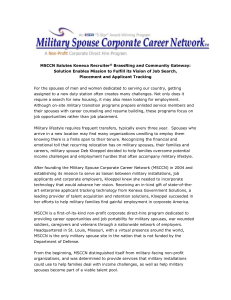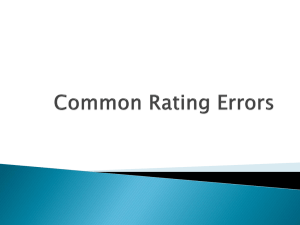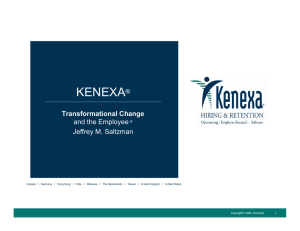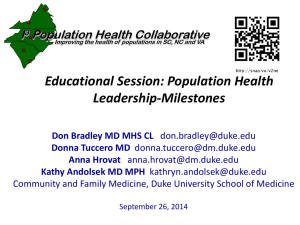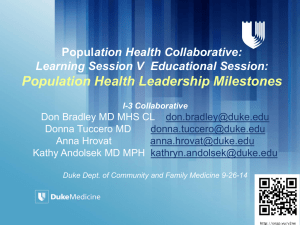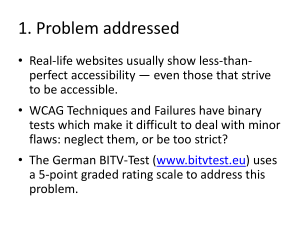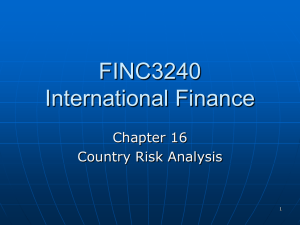DUH Pay and Performance - Duke Human Resources
advertisement
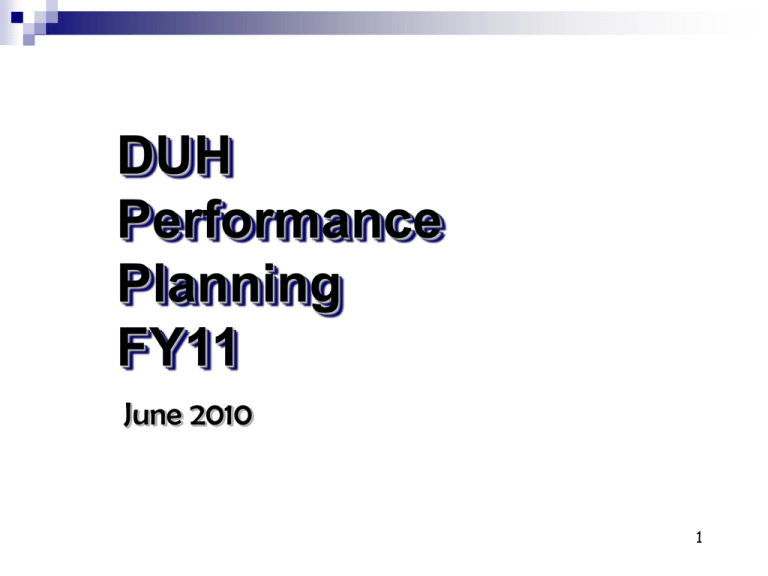
DUH Performance Planning FY11 June 2010 1 Objectives Performance Planning Overview PPS Preparation Kenexa/Career Tracker Requirements & Reminders Performance Planning Tools Job Expectation template Performance Management Behaviors template Development Planning form Policy Reminders & Don’t Forget to’s P&P Website Review Manager’s Checklist Dates to Remember Resources Next Steps 2 Performance Management Process July-September 2009 Evaluate performance results and behaviors for FY09; Performance planning for FY10 PLANNING January/February 2010 Mid Year Reviews Interim meeting with supervisor to review progress toward FY10 goals COACHING/ FEEDBACK July –September 2010 Evaluate performance results and behaviors for FY10; Performance Planning for FY11 EVALUATION/ DEVELOPMENT September – October 2010 Reward paid for FY10 REWARD Individual goals are linked to department goals. .. Duke Hospital Goals Department/Clinical Service Unit Goals Individual/Team Performance Expectations Job Results Behaviors Performance-based pay . . . and link pay with performance. Performance management Duke University Health System’s Goals Performance Management Compliance Expected Job Results Expected Behaviors Staff Member: Staff Member: • Population-Specific • Unit-Specific • JCAHO Supervisor: +DUHS Compliance • Customer Service • Teamwork • Creative ProblemSolving • Continuous Learning • Diversity • Integrity Staff Member & Supervisor: • Quality& Patient Safety • Customer • Work Culture • Finance Supervisor: +Strategic Communication +Performance Management Y/N 50% Overall Performance Rating 100% 50% PPS Preparation Kenexa • Duke Net ID • Verify current employees are included in Kenexa Career Tracker (exclude new hires and transfers) • If employees are missing –Email employee(s) name and unique ID or screen shot from Report Express to Bernie Rice or Meloney Williams Schedule Kenexa ‘refresher training’, if necessary Mark your calendars for reviews To be held in June and July Post sign-up sheet/schedule evaluations with each employee Send PPS packets to employees, request completion and return to manager on date requested Get copy of current work unit Balanced Score Card (May) Notify your supervisor (managers, directors, AOO, ACNO’s) of all employees who you anticipate will receive an ‘Exceeds’ or ‘Needs Improvement’ 6 Kenexa Training June 30 2:00 - 4:30 June 30 8:30 - 11:00 July 08 8:30 - 11:00 All classes are held at 406 Oregon Street, Lab 101. Online registration is available at the link below: https://www.hr.duke.edu/training/workshops/ Click on Management Development Then click on Kenexa Training 7 Kenexa Requirements At Minimum: Enter Population Specific Competencies (as applicable) Enter overall rating on the last page Remember that “Submit”” locks your rating Electronically sign each PPS 8 Accessing Kenexa Navigating to Kenexa on revised Duke HR Website Go to http://www.hr.duke.edu Click "Compensation" link under Duke Human Resources heading. Scroll down the page and look for "Performance Management" on the right hand side - click on "Duke University Health System". On left side, click on PPR Systems and Forms. Kenexa link will be on right hand side towards the top. 9 Entering the Final Rating Navigate to the Duke HR homepage www.hr.duke.edu to enter Kenexa Select your direct report Enter the Performance Planning Year (2009-10) Enter the Population Specific Competencies, if applicable Complete the Behavioral Template (Excel Version) Enter “Overall Rating” on last page 10 Kenexa… Enter ‘0’ for employees who are ineligible for a PPS review. Enter ratings for employees who transfer. Enter ratings for employee who are promoted. Enter ratings for employees on leave. 11 PPS Tools 1. 2. Employee Instructions/letter/email Job Expectations Template Behavioral Template Annual Employee Signature Sheet Balanced Score Card (suggested) 3. Professional Development Plan 12 Cover Page Duke University Hospital Annual Performance Review SECTION I: Staff Member Name: Supervisor Name: Year: Manager to complete this form and have employee and manager sign and date 2007-08 Date Completed: SECTION II: POPULATION SPECIFIC COMPETENCIES 1. Employee provides patient care/services. Yes [ ] No If Yes, complete #2 2. The above staff member is able to demonstrate the knowledge and skills necessary to provide care appropriate to specific ages as outlined in the job responsibilities (e.g., knowledge of growth and development; ability to assess population-specific data; ability to interpret populationspecific data; ability to provide population-specific care; possesses communication skills necessary to interpret population-specific response to treatment; ability to involve family/significant other in decision making related to plan of care). [ ] Yes, see Population-Specific Competency Validation form [ ] No* [ ]Not Applicable * Entry of a “No” rating automatically defaults to ‘Below Expectations’ in Kenexa SECTION III PERFORMANCE EXPECTATIONS Needs Improvement* Fully Achieves Exceeds* (50% of Overall Rating) Clinical Quality/ Internal Business Customer Service Work Culture Finance BEHAVIORS (50% of Overall Rating) OVERALL RATING *Provide supporting documentation or comments for an ‘Exceeds’ or ‘Needs Improvement’ rating. SECTION IV Acknowledgement & Approval Please Print/Sign EMPLOYEE: Date MANAGER: Next Level Approval: 13 CNI JOB EXPECTATION TEMPLATE BSC Quadrant: Clinical Quality/Internal Business. Foster enhanced, clinical care and operational processes to improve patient safety, clinical quality, operation efficiency and creative problem solving Standards Fully Achieves Exceeds Meets CN I expectations Meets 75% of the components for the CN II Clinical Ladder tract Unit compliance meets targets for Balanced Scorecard/Critical Success Factors Unit meets targets for documenting nursing process within hospital standard using standard plans of care ( Pain, Wound, Restraints, Patient education, Discharge instructions) Balanced Score Card Data Falls – Unit target 0.60 Currently ________ -BSI –Target 3.49 Currently ________ - ADEs Unit Target 3.35% Currently _______ - Pressure Ulcer Target 1.76 Currently ________ Meets 90% of components of Clinical Ladder CN II tract Unit compliance exceeds targets for Balanced Scorecard/Critical Success Factors Uses expanded resources to individualize plan of care based on needs of patient Actively monitors individual and unit compliance with expected standards Corrects safety deficiencies in a manner that supports meeting unit targets Functions as Charge Nurse Functions as Preceptor Function as Administrative Resource (scheduler/patient flow) Goes beyond unit expectations in competencies/scope of duty -Utilizes patient safety principles in practice -6 Rights of Medication Safety -JCAHO Patient Safety Goals -Environment of care -Recognizes actual or potential safety issues, notifies appropriate person, and appropriately -Documents in SRS Serve as unit expert for specific patient populations Participates in unit audits (specify) Demo consistent critical thinking skills Use appropriate resources to individualize POC Manager Feedback Manager adds comments here during evaluation Employee Feedback Employees completes self assessment on achieving metrics and key job expectations 14 Behavior Template Employee completes as part of selfassessment. Manager adjusts if needed during the review with employee. PERFORMANCE MANAGEMENT BEHAVIORS FOR MANAGERS AND STAFF ( MANAGER-SPECIFIC* ) Name: _______________________________________________________ Date: ___________________ As of July 1, 2008 Key: 1: Below = Inconsistent Demonstration of Expected Behaviors 2: Achieves = Demonstrates Expected Behaviors 3: Exceeds = Role Models Expected Behaviors Behavior Description of Behavior All managers and staff are expected to adhere to the Workplace Expectations and Guidelines Customer Service Demonstrates a commitment to quality service Consistently demonstrates a personal commitment to Patient Health and Safety. Score Practices good customer service: Seeks patient/visitor interaction, makes eye contact, smiles, says "thank you", listens actively, and responds to patients/visitors and fellow staff with Courtesy and Respect; practices service recovery when needed (using the "HEART" model, for example). Maintains patient confidentiality, gives undivided attention to patients/visitors, never exposes them to inappropriate personal conversations. Uses respectful, courteous and helpful language when communicating with supervisors, co-workers and customers Dress for work in accordance with the DUH Dress policy and /or department guidelines. Teamwork Contributes to the team environment Understands own role, appreciates what others do, and supports the team through good attendance. Helps and supports other team members to address patient concerns, foster team health and safety, solve problems, and accomplish team goals. Contributes to a positive team by acting positively…discourages gossip and negative talk. Communicates openly and respectfully and helps to resolve conflicts within the team. Celebrates when the team does well. Is productive and uses all available time to accomplish expected work - personal business is accoomplished outside of work time and/or during scheduled time off. Identifies safety issues, and reports all hazards, incidents and safety concerns on a timely basis. Cooperates and collaborates with supervisors and co-workers in performing assignments and service requests. Attends work as scheduled - arrives on time fully prepared to begin work and remain at work through Creative Problem Solving the entire work period and requests authorization according to established department procedures if there is a need to leave the workplace. Helps the team solve problems Shares ideas to solve problems. Continuous Learning Diversity Integrity Tackles problems and accepts solutions with positive and "can-do" attitude. Supports learning and development for self and others Participates in personal and professional learning opportunities, and supports others when they participate. Understands diversity and how it contributes to the team Communicates in a respectful manner with consideration for a person's race, color, religion, national origin, disability, veteran status, sexual orientation, gender, age, or position. Helps provide a comfortable work environment that is free of harassment. Is aware of own biases, doesn't assume that his/her perspective is the 'right' one, and remains sensitive to cross-cultural differences. Acts in good faith and honesty. Behaves with honesty and integrity in all employment actions including the maintenance and completion of records, and the accurate recording of time worked. Uses and safeguards the property of others and of Duke through proper and authorized use Uses Duke's property only for legitimate work purposes. *The 2 behaviors below are only applicable to managers. These should not be rated for non-managers Performance Management* Acts in the best interests of DUHS, the Hospital, and the Department Consistently manages departmental and individual performance by providing influential leadership through Conveyschange. a message of Strength, Hope, and Caring in who we are and what we do for patients/visitors; Strategic Communication* recognizes staff through recognition programs. Meets performance management deadlines; takes the time to provide feedback, professional development planning, and coaching/mentoring throughout the year, and maintains strict confidentiality with each staff member. Leads by example Learns from mistakes, allows staff to also learn through mistakes as appropriate. Coaches, counsels, mentors staff about performance and development; provides clear and timely feedback and suggestions. 15 The Professional Development Plan ... Documents goals, skills, competencies, experience and objectives to be accomplished over the next year Supports continuous improvement and career development for the staff member Is a core component of workforce planning Requires review between the staff member and supervisor throughout the year Professional Development Plan • Goals • Skills/Competencies/ Experience • Objective/Action Plan The Game Plan! Introduce the employee to the plan Explain the coaching and feedback process Introduce the feedback tools that will be used Assess individuals’ strengths and weaknesses Evaluate employee’s present skills, background, strengths and preferences. Identify area(s) for development Identify organizational needs what are critical skill needs? Develop the feedback partnership Partner with employee to identify skill development strategies Align the individual development plan with the organizational goals Policy Reminders 18 Transfer Guidelines Greater than six months on previous unit Previous manager should complete evaluation with employee and forward to new manager New manager should facilitate the process New manager enters final rating into Kenexa 19 Pay Policy Reminders Increase to base pay Employees at or over the band maximum will receive a lump sum increase Staff hired Jan 1-March 30 are eligible for 50% of the PPS increase Staff hired after April 1 are not eligible for a PPS increase Nursing Pay Policies Promotions from CNI to CNII will receive a lump sum payment of 3% of annual pay. • Lump Sum Payment = hourly rate of pay multiplied by FTE multiplied by 2080 hours multiplied by 3% (payment calculation does not include overtime, premiums, etc) CN I will be eligible to receive a merit increase in October. This is based on the standard eligibility requirements. Hired between January 1 thru March 31 – eligible for 50% merit Hired between April 1 thru June 30 – no merit increase P&P Website Review 22 www.hr.duke.edu Click Here 23 HR Website Scroll Down Until you can see the whole Performance Management Section 24 HR Website Click on Duke University Health System 25 HR Website Click on PPR System & Forms 26 HR Website Click on PPR System (Kenexa Career Tracker 27 Manager’s Checklist 28 Manager Checklist Access Kenexa/Career Tracker (www.hr.duke.edu) Click on the ‘Compensation’ tab - Scroll down to Performance Management (DUHS) – Click on PPR Forms (on the left hand side of the screen) Enter your Net ID Enter the Performance Feedback and the weights for each BSC quadrant Note: Customer Service should be at least 25% Enter the Overall Rating into Kenexa beginning July 1. Deadline will be determined. Verify that you can view all your current employees If employees are missing, contact Bernie Rice @ 681-2484 or Meloney Williams @ 668-2170 o Send an email with employee’s name and unique ID or screen shot from Report Express of the missing employees. Schedule refresher training, if needed Schedule Evaluation date Performance Management Process – Paper Process Distribute PPS Employee packets to staff (include casual, transfer, promotions) o Cover page with instructions and date/time for evaluation o Job Expectations Template for employee feedback o Employee Self-Evaluation with due date o Population Specific Competencies* Manager Preparation Review Self Evaluations before meeting with employee Review progress since midyear (peer feedback and developmental goals) Consult with next level Supervisor regarding employees with questionable ratings Meet with employee to finalize ratings Enter ratings into Kenexa by deadline Be diligent of ratings (DUHS) Reminders Be aware Kenexa/Career Tracker may respond slowly if the majority of users are accessing the system at once. Staff hired after April 1 are not eligible for a PPS increase - Enter ‘N/A’ for the overall rating. Ensure current licensure, safety training, education record/Active Staffeer, CBO Note: Entry of a “No” rating automatically defaults to ‘Below Expectations’ in Kenexa & receipt of Duke Staff handbook on file o Annual Competencies Use most recent data for ratings (typically May) o Behavioral Template (Excel version) o BSC/CSF Follow the instructions provided above to access Kenexa o NDNQI Enter the Overall Rating into Kenexa beginning July 1 o Work Culture Performance Management Process - Using Kenexa Navigate to the Duke HR homepage - www.hr.duke.edu to enter Kenexa Select the appropriate direct report o Unit Audits If development planning occurs at annual evaluation session, update/revise template without BSC targets until available Enter the Performance Rating Year Enter the Population Specific Competencies* Note: Entry of a “No” rating automatically defaults to ‘Below Expectations’ in Kenexa 29 Dates to Remember July 1 – Begin entering ratings into Kenexa August 20th - Deadline for entry of final ratings into Kenexa 30 Next Steps Blue Line memo will be sent by June 17 and will include key forms and deadline for ratings submission into Kenexa Notify your supervisor (managers, directors, VP’s, ACNO’s) of all employees who you anticipate will receive an EX or NI 31 Resources Kenexa/Career Tracker/Templates Bernie Rice 681-2484 Meloney Williams 668-2170 Policy Questions Tanya Griffin 668-7235 P&P Website Heather Gaudaur 684-5024 32 Questions??? 33
